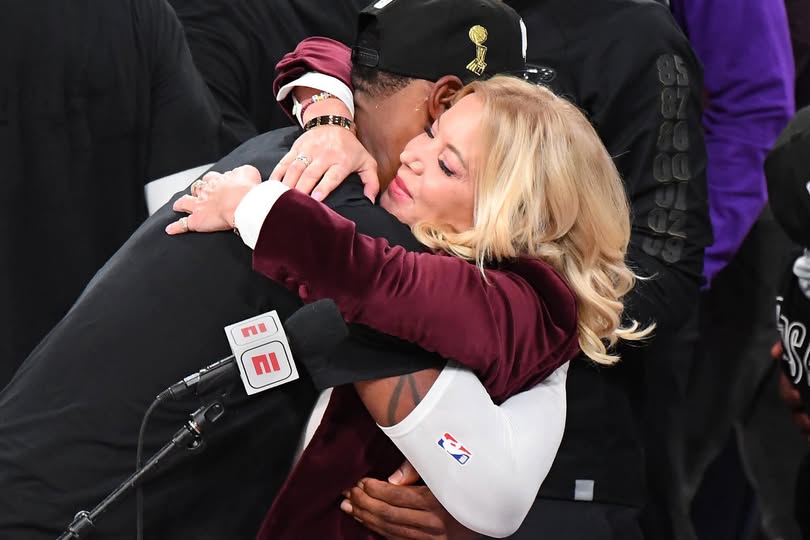BREAKING: The Buss family is entering an agreement to sell majority ownership of the Los Angeles Lakers to billionaire investor and Hollywood titan Mark Walter, in a blockbuster move that will reshape the landscape of professional basketball forever. For decades, the Lakers have been synonymous with the Buss name—a family dynasty that has stewarded one of the most iconic franchises in all of sports. But now, in a stunning and emotional turn of events, that chapter is coming to a close, ushering in a new era under Walter’s leadership that could redefine what it means to own, manage, and build a global basketball brand.
The news has hit the NBA like an earthquake. For many fans, especially those in Los Angeles, the Lakers and the Buss family are inseparable. Dr. Jerry Buss purchased the team in 1979, and under his guidance, the Lakers transformed into the “Showtime” franchise—a symbol of glitz, dominance, and relentless championship pursuit. With 17 NBA titles, a parade of Hall of Famers, and a brand that transcends borders, the Lakers became more than just a basketball team. They became a cultural institution. Now, with the family reportedly finalizing a deal to transfer majority control, it marks the end of an era and the beginning of something entirely different.
Mark Walter, best known as the controlling owner of the Los Angeles Dodgers and the CEO of Guggenheim Partners, is no stranger to high-stakes sports and entertainment investment. Under his ownership, the Dodgers became a powerhouse, with consistent postseason appearances and a World Series title. Walter also holds stakes in Chelsea F.C. and the WNBA’s Los Angeles Sparks. His portfolio reflects both ambition and a firm understanding of modern sports economics. His potential stewardship of the Lakers indicates a desire to extend that legacy into the NBA—perhaps the most globally influential league of them all.
The deal, according to sources close to the situation, has been in the works for months. While the Buss family has remained publicly committed to retaining control, internal discussions reportedly intensified in early 2025 amid growing financial pressures, league-wide shifts in ownership models, and strategic disagreements on the direction of the franchise. With television revenue models changing and the NBA’s global expansion requiring more aggressive capitalization, the Lakers found themselves at a crossroads. Walter’s bid reportedly values the franchise at over $9 billion, a staggering number that not only reflects the team’s legacy but also its commercial potential in the evolving sports landscape.
Jeanie Buss, who has served as the Lakers’ governor and president since her father’s passing in 2013, is expected to retain a minority stake and remain in an advisory role. Sources indicate that this was a non-negotiable part of the agreement. Walter and his investment group reportedly view her institutional knowledge and deep roots within the league as vital to ensuring a smooth transition and maintaining continuity in a brand built on decades of emotional investment from fans around the globe. The Buss family’s remaining involvement, though symbolic, will represent the last vestiges of a dynasty that once held the NBA in a firm, charismatic grip.
For Lakers fans, this news is jarring. Generations have grown up with the Buss name tied intimately to the identity of the purple and gold. From Magic Johnson to Kobe Bryant, from Phil Jackson to LeBron James, the family has been the constant—the engine behind it all. The thought of an outsider stepping in, even one with the credentials and resources of Mark Walter, raises inevitable questions about authenticity, culture, and what the future really holds. Will the “Lakers way” survive this transition, or will it be redefined entirely?
There’s also the competitive dimension to consider. The Lakers have struggled with consistency since their 2020 championship run in the NBA bubble. A series of roster miscalculations, aging superstars, and injury woes have hampered their ability to build sustained success. Walter is expected to bring a more analytics-driven, infrastructure-heavy approach to basketball operations, possibly mirroring the systems he put in place with the Dodgers. That could mean a broader organizational overhaul—from front-office leadership to scouting and player development. It could also mean a new willingness to spend aggressively on facilities, technology, and global marketing.
Walter’s entry comes at a pivotal moment for the NBA itself. As the league prepares for its next broadcast rights negotiation and explores expansion markets, the role of ownership is under increasing scrutiny. The modern owner is no longer just a wealthy fan—they’re a visionary CEO. With private equity funds entering the fray, valuations skyrocketing, and labor relations becoming more complex, the ability to navigate financial, political, and cultural terrain is essential. Walter, with his proven track record and deep Rolodex, appears poised to meet that challenge. But the NBA isn’t Major League Baseball or the Premier League. Success here is measured not just in wins, but in legacy—and the Lakers’ legacy is sacrosanct.



